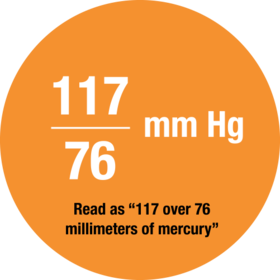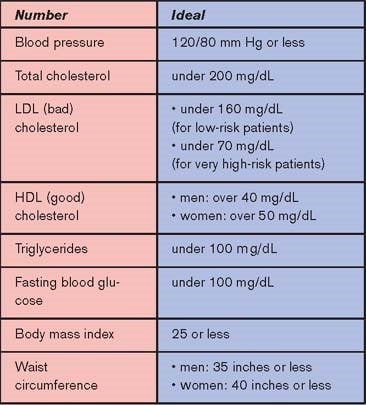February is Heart Health Month
Heart disease is the leading cause of death for both men and women. You can make healthy changes to lower your risk of developing heart disease. Controlling and preventing risk factors is important for people who already have heart disease.
To lower your risk:
Watch your weight
Quit smoking and stay away from secondhand smoke.
Control your cholesterol and blood pressure.
If you drink alcohol, drink only in moderation.
Get active and eat healthy
Heart disease is the leading cause of death for both men and women. You can make healthy changes to lower your risk of developing heart disease. Controlling and preventing risk factors is important for people who already have heart disease.
To lower your risk:
Watch your weight
Quit smoking and stay away from secondhand smoke.
Control your cholesterol and blood pressure.
If you drink alcohol, drink only in moderation.
Get active and eat healthy
Know Your Blood Pressure Numbers and Cholesterol Numbers
High Blood Pressure is a risk factor for Heart Disease.
What do your blood pressure numbers mean?
The only way to know (diagnose) if you have high blood pressure (HBP or hypertension) is to have your Blood Pressure taken. Understanding your blood pressure numbers is key to controlling high blood pressure.
Healthy and unhealthy blood pressure ranges
Learn what’s considered normal, as recommended by the American Heart Association
Blood Pressure Systolic mm Hg Diastolic mm Hg
Category Upper # Lower #
Normal Less than 120 and Less than 80
Prehypertension 120 – 139 or 80 – 89
High Blood Pressure 140 – 159 or 90 - 99
(Hypertension) Stage 1
High Blood Pressure 160 or higher or 100 or higher
(Hypertension) Stage 2
HYPERTENSIVE CRISIS Higher than 180 or Higher than 110
Emergency Care Needed
Note: A diagnosis of high blood pressure must be confirmed with a medical professional. A doctor should also evaluate any unusually low blood pressure readings. Additionally, lower targets may be appropriate for some populations such as African-Americans, the elderly, or patients with underlying issues such as diabetes mellitus or chronic kidney disease.
High Blood Pressure is a risk factor for Heart Disease.
What do your blood pressure numbers mean?
The only way to know (diagnose) if you have high blood pressure (HBP or hypertension) is to have your Blood Pressure taken. Understanding your blood pressure numbers is key to controlling high blood pressure.
Healthy and unhealthy blood pressure ranges
Learn what’s considered normal, as recommended by the American Heart Association
Blood Pressure Systolic mm Hg Diastolic mm Hg
Category Upper # Lower #
Normal Less than 120 and Less than 80
Prehypertension 120 – 139 or 80 – 89
High Blood Pressure 140 – 159 or 90 - 99
(Hypertension) Stage 1
High Blood Pressure 160 or higher or 100 or higher
(Hypertension) Stage 2
HYPERTENSIVE CRISIS Higher than 180 or Higher than 110
Emergency Care Needed
Note: A diagnosis of high blood pressure must be confirmed with a medical professional. A doctor should also evaluate any unusually low blood pressure readings. Additionally, lower targets may be appropriate for some populations such as African-Americans, the elderly, or patients with underlying issues such as diabetes mellitus or chronic kidney disease.
Your blood pressure numbers and what they mean
Your blood pressure is recorded as two numbers:
- Systolic blood pressure (the upper number) — indicates how much pressure your blood is exerting against your artery walls when the heart beats.
- Diastolic blood pressure (the lower number) — indicates how much pressure your blood is exerting against your artery walls while the heart is resting between beats.
Which number is more important?
Typically, more attention is given to systolic blood pressure (the top number) as a major risk factor for cardiovascular disease for people over 50. In most people, systolic blood pressure rises steadily with age due to the increasing stiffness of large arteries, long-term build-up of plaque and an increased incidence of cardiac and vascular disease. However, elevated systolic or diastolic blood pressure alone may be used to make a diagnosis of high blood pressure. And, according to recent studies, the risk of death from ischemic heart disease and stroke doubles with every 20 mm Hg systolic or 10 mm Hg diastolic increase among people from age 40 to 89.
Why blood pressure is measured in mm Hg
The abbreviation mm Hg means millimeters of mercury. Why mercury? Mercury was used in the first accurate pressure gauges and is still used as the standard unit of measurement for pressure in medicine.
What Is Cholesterol and What Are Your Numbers
High cholesterol is one of the big risk factors for heart disease, heart attack and stroke that you can control.
As your blood cholesterol rises, so does your risk of heart disease. If you have other risk factors such as smoking, high blood pressure or diabetes, this risk increases even further. The greater the level of each risk factor, the more that factor affects your overall risk. Your cholesterol level can be affected by your age, gender, family health history and diet.
When too much LDL (bad) cholesterol circulates in the blood, it can slowly build up in the inner walls of the arteries that feed the heart and brain. Together with other substances, cholesterol can form a thick, hard deposit called plaque that can narrow the arteries and make them less flexible. This condition is known as atherosclerosis. If a clot forms and blocks a narrowed artery, a heart attack or stroke can result.
How’s your cholesterol? Time to get it checked!
Keeping your cholesterol levels healthy is a great way to keep your heart healthy – and lower your chances of getting heart disease or having a stroke. But first, you have to know your cholesterol numbers.
The American Heart Association recommends all adults age 20 or older have their cholesterol, and other traditional risk factors, checked every four to six years.
Your blood test report will show your cholesterol levels in milligrams per deciliter of blood (mg/dL). To determine how your cholesterol levels affect your risk of heart disease, your doctor will also take into account other risk factors such as age, family history, smoking and high blood pressure. The two types of lipoproteins that carry cholesterol to and from cells are low-density lipoprotein, or LDL, and high-density lipoprotein, or HDL. LDL cholesterol and HDL cholesterol, along with one fifth of your triglyceride level, make up your total cholesterol count, which can be determined through a blood test.
LDL (Bad) Cholesterol
LDL cholesterol is considered the “bad” cholesterol because it contributes to plaque, a thick, hard deposit that can clog arteries and make them less flexible. This condition is known as atherosclerosis. If a clot forms and blocks a narrowed artery, heart attack or stroke can result. Another condition called peripheral artery disease can develop when plaque buildup narrows an artery supplying blood to the legs.
HDL (Good) Cholesterol
HDL cholesterol is considered “good” cholesterol because it helps remove LDL cholesterol from the arteries. Experts believe HDL acts as a scavenger, carrying LDL cholesterol away from the arteries and back to the liver, where it is broken down and passed from the body. One-fourth to one-third of blood cholesterol is carried by HDL. A healthy level of HDL cholesterol may also protect against heart attack and stroke, while low levels of HDL cholesterol have been shown to increase the risk of heart disease.
Triglycerides
Triglycerides are another type of fat, and they’re used to store excess energy from your diet. High levels of triglycerides in the blood are associated with atherosclerosis. Elevated triglycerides can be caused by overweight and obesity, physical inactivity, cigarette smoking, excess alcohol consumption and a diet very high in carbohydrates (more than 60 percent of total calories). Underlying diseases or genetic disorders are sometimes the cause of high triglycerides. People with high triglycerides often have a high total cholesterol level, including a high LDL cholesterol (bad) level and a low HDL cholesterol (good) level. Many people with heart disease or diabetes also have high triglyceride levels.
Many people do not know their cholesterol is too high because there are usually no symptoms. That's why it is important to have your cholesterol levels checked by your doctor.
Talk with your doctor or other healthcare provider about assessing your risk for a heart attack or stroke. Cholesterol levels are an important factor in estimating your personal risk.
Know your numbers.
What's your blood pressure, total cholesterol, LDL (bad) cholesterol, HDL (good) cholesterol, your fasting blood glucose, triglycerides, body mass index and waist circumference? How do your numbers compare to the ideal? To keep close tabs on your numbers, get a copy of your lab report from your doctor. When you know where you stand, you're more likely to follow you and your doctor's plan for managing your important health factors.
For more information on Blood Pressure click on the heart!
35 Rock Pointe Lane, Warrenton VA 20186 I 540-347-0394 FAX 540-349-3262
The Fauquier Free Clinic is a registered 501(c)(3) Nonprofit organization I EIN # 54-1669652
The Fauquier Free Clinic is a registered 501(c)(3) Nonprofit organization I EIN # 54-1669652







